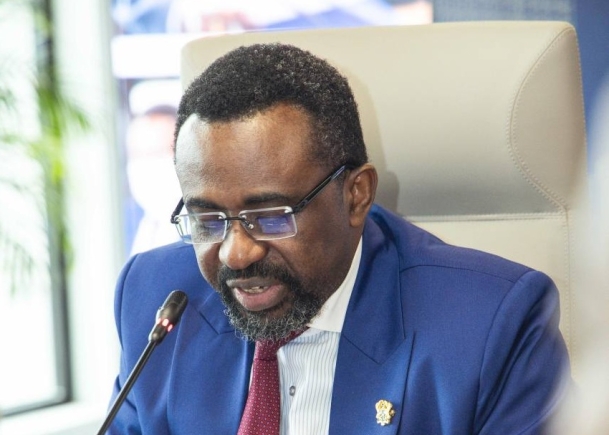The Governor of the Bank of Ghana (BoG), Dr Johnson Pandit Asiama, has called on the financial sector to assess its credit infrastructure as the era of high lending rates draws to a close.
He said the consistent decline in inflation and the strengthening of the Ghana cedi had paved the way for a shift away from the tight monetary policy stance adopted over the past few years.
Speaking at the maiden post- Monetary Policy Committee (MPC) Policy Seminar in Accra yesterday, Dr Asiama forecasted that there could be a further cut in the central bank’s policy rate, the rate at which it lends to universal banks, which could push the lending rates of banks further down.
The Governor said the development, while favourable for borrowers, presented structural challenges for financial institutions, especially banks.
“The era of high interest rates and passive investment by banks and governments is ending. Banks must now begin to reimagine their business models, refocusing on innovation and credit expansion to productive sectors, Dr Asiama said at the Policy Seminar organised by the Chartered Institute of Bankers (CIB) Ghana.
“With inflation decelerating and rates on the downward path, there is a unique opportunity to support private sector growth, to support small and medium-sized enterprises (SMEs), to support agriculture and green financing,” the Governor added.
It was on the theme: “Monetary Policy in Action: How MPC Decisions shape Ghana's Economy and Financial Sector”.
It brought together players in the banking sector, industry players and students to dissect the latest decisions of the BoG’s MPC and explore the delicate balance between controlling inflation and stimulating economic growth.
Notable among the attendees were the President of the Association of Ghana Industries (AGI), Dr Humphrey Ayim-Darke; the Chief Executive Officer (CEO) of AGI, Seth Twum-Akwaboah; the President of the Ghana Union of Traders’ Associations (GUTA), Joseph Obeng, and Associate Professor of Economics, Professor Festus Ebo Turkson.
Others were the President of CIB Ghana, Benjamin Amenumey; the Vice-President of CIB Ghana, Togbe Asiama Krakani V; the Executive Director for Corporate and Investment Banking at Absa Bank Ghana, Ellen Ohene-Afoakwa; as well as a council member of CIB Ghana and CEO of National Banking College (NBC), Gloria Darline Quartey.
Credit infrastructure
Dr Asiama stressed the need for banks to overhaul their credit delivery systems and move away from their reliance on treasury instruments and high-yielding government securities.
“A number of banks already have high non-performing loan (NPL) ratios. The win-win situation, until January, when we get more clarity, is that banks must begin assessing their credit infrastructure,” he stated.
Dr Asiama disclosed that the central bank would soon issue a directive on credit rationing and assessment, aimed at compelling financial institutions to strengthen credit appraisal processes and expand access to credit for viable businesses.
Context
Ghana has achieved significant progress in economic recovery and stability, with headline inflation declining for six consecutive months to 13.7 per cent in June 2025.
Additionally, the country’s real Gross Domestic Product (GDP) expanded by 5.3 per cent in the first quarter of the year, driven by agriculture and the services sectors.
The growth, according to the Governor, must be leveraged to support key economic sectors, stressing that macroeconomic stability alone was insufficient without tangible benefits for businesses and citizens.
“A stable macroeconomic environment is only meaningful if it translates into access to affordable credit, job creation, and inclusive economic transformation.
The financial sector must be the bridge.
Your industry must be the bridge, not the bottom,” Dr Asiama stated.
Readiness
The CEO of the CIB Ghana, Robert Dzato, in an interview with the Daily Graphic, affirmed the sector’s readiness to adapt to the country’s shifting monetary environment.
However, he emphasised that successful adaptation required banks to focus on fundamental competencies, particularly risk management capabilities.
“The business of banking is actually risk management wrapped up in customer centricity and some innovative solutions,” Mr Dzato stated, highlighting the core skills banks must master in the new low-interest environment.
The CEO of the CIB Ghana identified two critical areas for development: building character through enhanced banking ethics and developing competence in proper credit risk assessment.
Mr Dzato explained that compliance remained paramount as banks navigated the transition, adding that the institute’s mandate extended beyond education to regulating banking practice standards.
Panel discussion
In a panel discussion, Dr Ayim-Darke said the recent 300-basis-point reduction in the policy rate by the BoG was significant, but not sufficient to ease the cost of doing business.
He said that although the cut reflected improved macroeconomic indicators, it had yet to translate into meaningful relief for manufacturers.
Dr Ayim-Darke observed that lending conditions remained tight, with credit likely to be selectively extended to top-performing corporates, leaving out the majority of SMEs.
He anticipated a further policy rate cut by September to enable credit easing to spur industrial growth, adding that Ghana’s lending rates were still among the highest in the sub-region.
